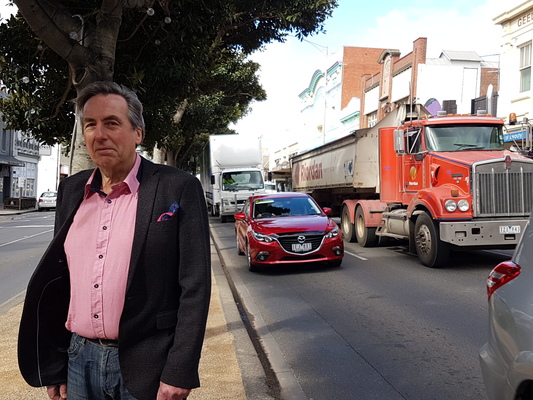By LUKE VOOGT
A veteran Geelong trader and former mayor has welcomed a proposal to cut the central city area’s speed limit to 40kmh.
Hayden Spurling, who has traded in Geelong for 45 years, said he regularly witnessed cars and trucks exceeding the current 50 kmh speed limit and running red lights.
“I think the 40 kmh is well overdue but it will only work if it’s policed,” he said.
“All we can do is encourage council to do it ASAP.”
Mr Spurling said he saw two trucks “racing each other” moments before talking to the Indy at his CBD store on Thursday.
Inadequate policing of speed limits in the CBD encouraged drivers to flout the law, he said.
“Everyone races to get to the next set of lights.”
City Hall’s William Tieppo announced the proposal this week.
A reduced speed zone would improve safety for all road users and access for pedestrians, he said.
“In the past five years there have been 156 crashes in central Geelong. Of these, 52 people suffered serious injuries.”
“These could have been prevented or lessened with a reduced speed limit.”
Mr Tieppo said the speed reduction would only add 23 seconds to the travelling time on Ryrie Street from Latrobe Terrace to Swanston Street.
The time would likely be less because the average speed in the zone subject to the reduced limit was already less than 40 kmh, he said.
Other major Australian cities, including Melbourne, had successfully introduced 40 kmh limits, he said.
“Central Geelong is a place for people to shop, work study, live, dine and be entertained.
“Our streets are the focus of these activities and vital for the CBD to a successful, vibrant and liveable city.”
Geelong’s council administrators will discuss the reduced speed proposal at their meeting next week.
Mr Spurling also welcomed a City Hall announcement this week that it would explore options to remove trucks from the CBD.
“They create noise, traffic and danger to pedestrians and road users, which is not desirable in a CBD,” he said.
The City has been trying to force trucks out of central Geelong for more than a decade amid concerns about traffic snarls, safety and pollution.
Previous efforts have included limiting access to Malop Street and directing trucks to use McKillop Street when travelling east or west across the city.
The McKillop Street move led to the street’s residents complaining about additional truck traffic outside their homes.









